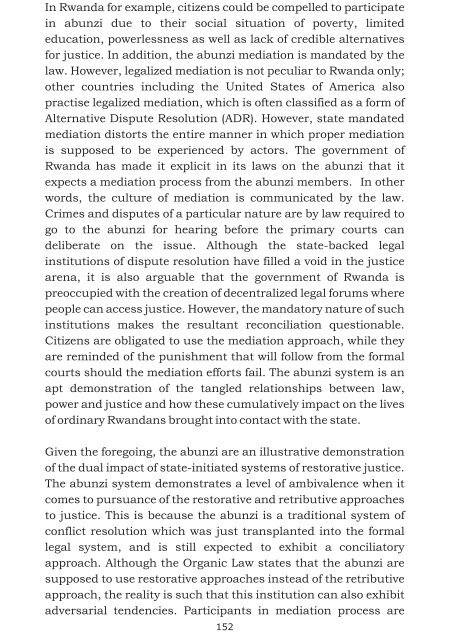Beneficiaries are actors too.pdf - Southern Institute of Peace ...
Beneficiaries are actors too.pdf - Southern Institute of Peace ...
Beneficiaries are actors too.pdf - Southern Institute of Peace ...
Create successful ePaper yourself
Turn your PDF publications into a flip-book with our unique Google optimized e-Paper software.
In Rwanda for example, citizens could be compelled to participate<br />
in abunzi due to their social situation <strong>of</strong> poverty, limited<br />
education, powerlessness as well as lack <strong>of</strong> credible alternatives<br />
for justice. In addition, the abunzi mediation is mandated by the<br />
law. However, legalized mediation is not peculiar to Rwanda only;<br />
other countries including the United States <strong>of</strong> America also<br />
practise legalized mediation, which is <strong>of</strong>ten classified as a form <strong>of</strong><br />
Alternative Dispute Resolution (ADR). However, state mandated<br />
mediation distorts the entire manner in which proper mediation<br />
is supposed to be experienced by <strong>actors</strong>. The government <strong>of</strong><br />
Rwanda has made it explicit in its laws on the abunzi that it<br />
expects a mediation process from the abunzi members. In other<br />
words, the culture <strong>of</strong> mediation is communicated by the law.<br />
Crimes and disputes <strong>of</strong> a particular nature <strong>are</strong> by law required to<br />
go to the abunzi for hearing before the primary courts can<br />
deliberate on the issue. Although the state-backed legal<br />
institutions <strong>of</strong> dispute resolution have filled a void in the justice<br />
<strong>are</strong>na, it is also arguable that the government <strong>of</strong> Rwanda is<br />
preoccupied with the creation <strong>of</strong> decentralized legal forums where<br />
people can access justice. However, the mandatory nature <strong>of</strong> such<br />
institutions makes the resultant reconciliation questionable.<br />
Citizens <strong>are</strong> obligated to use the mediation approach, while they<br />
<strong>are</strong> reminded <strong>of</strong> the punishment that will follow from the formal<br />
courts should the mediation efforts fail. The abunzi system is an<br />
apt demonstration <strong>of</strong> the tangled relationships between law,<br />
power and justice and how these cumulatively impact on the lives<br />
<strong>of</strong> ordinary Rwandans brought into contact with the state.<br />
Given the foregoing, the abunzi <strong>are</strong> an illustrative demonstration<br />
<strong>of</strong> the dual impact <strong>of</strong> state-initiated systems <strong>of</strong> restorative justice.<br />
The abunzi system demonstrates a level <strong>of</strong> ambivalence when it<br />
comes to pursuance <strong>of</strong> the restorative and retributive approaches<br />
to justice. This is because the abunzi is a traditional system <strong>of</strong><br />
conflict resolution which was just transplanted into the formal<br />
legal system, and is still expected to exhibit a conciliatory<br />
approach. Although the Organic Law states that the abunzi <strong>are</strong><br />
supposed to use restorative approaches instead <strong>of</strong> the retributive<br />
approach, the reality is such that this institution can also exhibit<br />
adversarial tendencies. Participants in mediation process <strong>are</strong><br />
152


